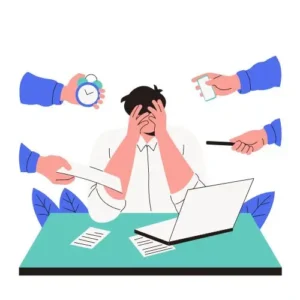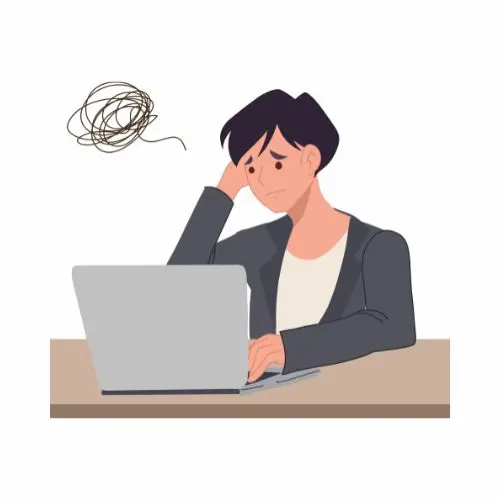Introduction
With the new job came a set of stressors present within the modern workplace: tight deadlines, long hours, workload pressures, and politics in the workplace, to name a few. A little bit of stress is an added conditioner that makes employees work hard, but chronic stress over the timeline takes its toll on the body and mind. Leaders need to identify warning signs immediately and make proactive efforts for their team members. Continue reading to discover common warning signs and some effective management strategies within the workplace.
Key Statistics: Impact of Workplace Stress
- 70-80% of employees report feeling stressed from their jobs daily.
- 75-90% of doctor visits Are for stress-related issues like fatigue, headaches, and ulcers.
- 120,000 deaths/year Linked to workplace stress from heart attacks, suicide, etc.
- Cost to organizations $300 billion/year due to decreased productivity and absenteeism.
- Clearly, unchecked stress takes a huge personal and financial toll. As leaders, it’s important to watch for signs of strain in team members and intervene appropriately.
Common Signs of Stress at Work
- Irritability & anger Lashing out at coworkers or customers, difficulty controlling emotions
- Fatigue & exhaustion Constant tiredness, lack of energy, difficulty concentrating
- Physical illnesses Stomach issues, headaches, changes in appetite or sleep
- Anxiety & restlessness Feeling nervous, on edge, unable to relax
- Poor work performance Missing deadlines, lower quality work, lack of focus
- Withdrawal from others Keeping to themselves, avoiding social interactions
- Change in habits Increase or decrease in smoking/drinking, weight changes
- Increased accidents Higher chances of errors or accidents due to lack of focus
- Procrastination Putting things off, difficulty making decisions
- Depression, Sadness, lack of motivation, feelings of hopelessness
Signs of Stress at Work in Detail

The workplace level of stress is growing, and many people feel overwhelmed, burnt out, or over the line in managing constant demands. Not all stress is bad; some can be motivating, but stress over time affects physical and mental health. As a manager, it is imperative to know their warning signs so you can help address the issues and ensure your teams’ well-being. Here are the top 10 signs that indicate an employee
Irritability and anger
These include impatience, short fuse, and quick temper. Employees may snap at colleagues over small issues, cannot control their emotions, or take customer frustrations out. Indeed, while an occasional bad day is understandable, chronic irritability and anger evoke red flags.
Fatigue and exhaustion
Long-term stress wears down both the body and mind, leading to constant tiredness. Employees may seem drained and lack energy, struggle to focus, and struggle to concentrate. This impacts work performance and productivity. Chronic fatigue that doesn’t improve with time off is a warning sign.
Physical illnesses
The body also compensates for the cost of living with stress by a greater chance of illness. General symptoms of stress include stomach aches, headaches, insomnia, changes in appetite, and other somatic symptoms. Other conditions attributed to chronic workplace stress include high blood pressure, heart disease, and obesity.
Anxiety and restlessness
The most common symptoms of tension, stress, and anxiety are jitteriness, being on edge, and an inability to relax. Workers may look restless and fidgety, cannot sit, or always fidget and tap their feet. This influences their concentration and interactions with other people.
Poor work performance
Stress has psychological and physical effects as well. It can lead to an inability to focus, multitask, think straight, and prioritize work. Employees come back late with their completion deadlines, present lower-quality work than usual, and have trouble doing routine tasks. Productivity and performance suffer through stress overload.
Withdrawal from others
Some employees pull in and become socially withdrawn to manage the internal feelings that accompany stress. They do not want to engage much with other people. They avoid conversations in the breakroom, they avoid joining teammates for lunches, and sometimes, they disconnect from coworkers at work. This is also a red flag.
Changes in habits
Changes in behaviors also indicate internal stress, whether it is the increase in bad habits like smoking or increased amounts of caffeine/alcohol consumption and perhaps a decrease in habits like exercise. Weight changes also tend to occur during periods of stress.
Increased accidents
Stress often means poor concentration and judgment, which may increase errors and mishaps at work. Some of these may include minor injuries, problems with quality control, or security/safety breaches simply because one gets distracted or overwhelmed.
Procrastination
Procrastinating behaviors indicate inner stress, such as putting things off and delaying decisions. An employee may shirk away from important tasks, leave paperwork half-done, or fear approaching some projects because they are too overwhelming.
Depression
In severely prolonged stress conditions without any relief, there may be a very severe state of depression related to such factors as there might be no motivation or low mood, sadness, hopelessness, and negative thoughts from employees. This seriously affects work and life.
As a manager, look for these mixes of signs in your employees. Their capability and ability to perform better will be saved from stress-related problems if approached before the situation worsens. Some proactive measures that managers can apply include
- Lead by example with a healthy work-life balance and self-care habits
- Check-in regularly with one-on-one meetings to build rapport and allow open discussions
- Educate employees on stress management techniques like exercise, meditation, mindfulness
- Assess workload and ensure priorities are clear to avoid feelings of being overwhelmed
- Promote the use of available wellness resources like EAP counseling, massage, and yoga classes
- Foster a supportive culture where employees feel comfortable discussing challenges
- Consider occasional team-building activities to boost morale and connections
- Monitor for signs of burnout and intervene with reduced duties or time off if needed
- Lead discussion on realistic expectations and eliminate unnecessary pressures.
With awareness and support from managers, workplaces can help employees maintain resilience to stress. Prioritizing mental wellness is crucial for attracting and retaining top talent in today’s competitive market.
The Bottom Line
In summary, workplace stress is a serious problem affecting employees and employers. Without a solution, it can cause extreme damage to their physical and mental conditions. Therefore, as managers, we should be able to look for signs indicating a team member is experiencing high pressure or even reaching burnout.
These comprise changes in mood, behavior, relationships, and work performance. Early intervention relief through open communication, workload assessment, wellness resource promotion, and supportive culture-early intervention. A highly engaged, happy workforce will not only be good for the mental wellness of its employees, but it will also lead to increased productivity, turnover reductions, and a competitive business. This would imply setting and implementing progressive priorities on mental health consciousness, evolving methods for dealing with stress, etc. This fosters a sustainable work environment where people are treated with respect and motivation and can balance job responsibility with self-care.


3 thoughts on “Top 10 Signs of Stress At Work”